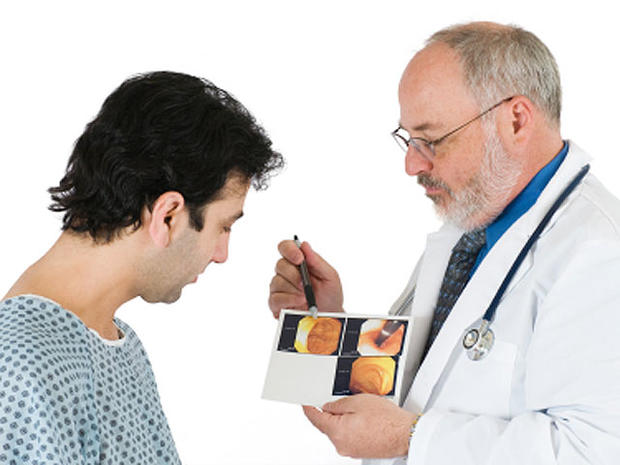Will laxative-free colon cancer screening encourage more people to get tested?
(CBS News) For some people, the uncomfortable nature of colon cancer screening - from the scope to the laxatives - is something they'd rather avoid even if it can help detect and prevent deadly cancer. But new research suggests that a laxative-free virtual colonoscopy might be just as effective as the common scope-based procedure at detecting polyps.
Cancer survivors urged to exercise and eat healthy in new guidelines
Experimental antibody drug stalls 7 kinds of cancer, study shows
Researchers at Massachusetts General Hospital (MGH) in Boston say they have developed a virtual colonoscopy that does not require patients to drink a dreaded laxative prior to the procedure, in the May 15 issue of Annals of Internal Medicine. Their version is off to a promising start: It was able to detect 91 percent of the patients who had the riskiest polyps that were 10 millimeters or larger.
"While we know that colon screening can save lives, not enough people participate, in part because of the discomfort of the required laxative preparation," study author Dr. Michael Zalis, director of CT Colonography at MGH Imaging, said in the press release. "In our study, the laxative-free form of CT colonography performed well enough that it might someday become an option for screening, which we hope would increase patient participation."
The most common method for colon cancer screening is a colonoscopy, in which a scope with a camera is inserted and scans the surface of the colon. Patients are often sedated for the procedure and must take laxatives - sometimes up to a gallon of liquid - before the test. Virtual colonscopy, known as CT colonography, has emerged in recent years - a procedure in which a tube is inserted to pump air into the colon to expand it while computers take 3-D images, but that too requires a fast overnight and a laxative for several hours before the test, so doctors can see a "clean" colon.
Scientists tested out their new laxative-free colonagraphy method on 605 men and women between the ages of 50 to 85. Two days prior to the procedure, the subjects were asked eat a low-fiber diet and drink small amounts of contrast agent dissolved in water three times a day. Then, they sat down for a 15 to 20 minute CT screening. The dye helped doctors distinguish food, drink or feces in the stomach and colon.
The subjects, who were allowed to return to work right after the procedure, only had one complaint: They felt like they were full of air because of the air that is pumped into their colon.
A downside to the virtual colonoscopy when compared to scope-based procedures is that with the scope, doctors can remove growths as they see them. So, those undergoing the new virtual procedure would have to partake in the scope-based test if anything suspicious was found. However, according to TIME, 85 percent of people getting screened have polyps too slow-growing to need treatment, so this might cut down on unnecessary discomfort for them.
Experts agree on the importance of getting screened for colon cancer. According to the study's press release, 120,000 new cases an approximately 50,000 deaths in the U.S. this year are attributable to a largely preventable disease. A recent studyalso found getting screened with a colonoscopy cut a person's risk of dying from colon cancer in half.
"If these results hold up in larger trials, we would expect this procedure would first be offered to moderate-risk patients who are otherwise unable or unwilling to be screened," Zalis said. "If we can validate that this form of CT colonography performs reasonably well for screening and is easier for patients, it could have a significant impact on reducing the incidence of colon cancer and related cancer deaths."
An associate professor of Radiology at Harvard Medical School, Zalis notes that the radiation dose associated with CT colonography is much lower than that of diagnostic CT scanning and would be considered safe for widespread screening.

